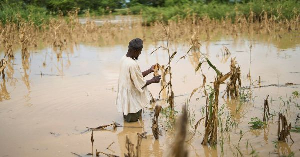District Chief Executive (DCE) for the Builsa South District Assembly Daniel Kwame Gariba has announced the Assembly’s intentions to put in place bye-laws to arrest and prosecute parents who deliberately refuse to send their children to school.
Mr Gariba noted that early childhood education was important for the development of the child and it was based on this measure that government has made it compulsory for every child school-going age to be in school.
However, government would not hesitate to punish people including parents who would not want to value the education of their children.
Mr Gariba said giving the child strong educational fundamentals would help it absorb any material of learning in the years of growth, adding that it would be prudent for parents and guardians to see the need in allowing their children to access schooling at the tender age so as to build good grounds in what they learn.
He said investing in their wards education was a laudable venture and parents should take up the challenge to ensure they invest much in their wards’ education especially the girl-child’s to enable the country generate good human resource for the development of all.
Mr Graiba reminded parents of their responsibilities and consider their children education since the Assembly would frown on parents who would deny their children education and engage them in cattle rearing and other business at the expense of their education.
Mr Gariba made this known at the weekend when he commissioned and handed over a three-unit classroom block to four communities namely Luisa, Fiias, Gobsa and Vundem at a cost of GH¢196,218 from the District Assembly Common Fund in the Kanjarga sub-area in the Upper East Region.
He indicated that education was the bedrock for national development and that a community that was not privileged to have education was a lost one, because the people living in it would not be able to control diseases, natural and artificial disasters among others.
Mr Gariba explained that there would be high rate of illiteracy and would not match with the current trend of development for the growth of the people in the area.
A three-bedroom apartment at cost of GH¢268,532.50 for the District Coordinating Director was also inspected and handed over to the Assembly for use.
Sub-chief of the area Kanbo-Nab Agalisi Adiok commended government for its timely intervention and said the community was prepared to support the assembly implement such measures so as to promote education in the area.
Kanbo-Nab Adiok said the community members were ready to support the education authorities to help impact quality education to their children since education has become the “walking stick for the visual person”.
He called on the Assembly to connect electricity to the facility to promote the teaching and learning of the information communication technology (ICT) and other subjects in the school.
The DCE later visited the Fumbisi Senior High Agriculture School to have a first-hand information on the beginning of the double-track system. He found out that 326 had reported for the Green track while 11 has reported for the Gold track out of the 746 requested.
Outgoing headmaster of the school Francis Adajagsah disclosed that for the green track, 146 has reported for General Arts, 76 for Home Science, 66 for Agricultural Science, 35 for Business and three General Science while in the gold track four reported for Business, three for General Arts, one for Agricultural Science and three for the General Science.
Mr Adajagsah assured that the school authorities support for the sustainability of the system and called on other stakeholders including parents not to politicize the programme but give it their concerns so as to bring about quality education in the country.
Regional News of Wednesday, 19 September 2018
Source: ghananewsagency.org













